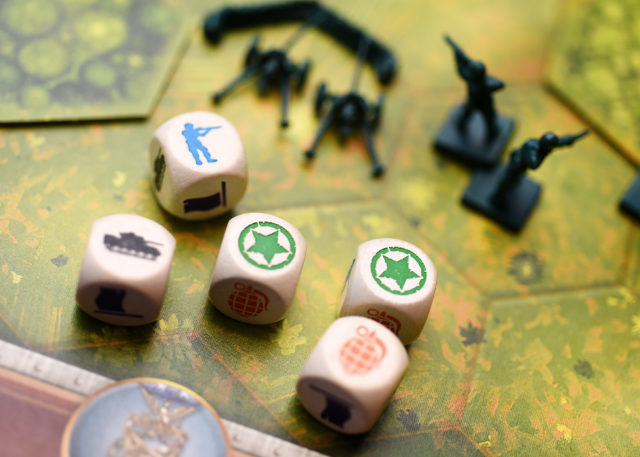Every once in a while, we like to take a look at specific publishers and list some of our favourite games from their catalogue. Days of Wonder has a reputation for publishing games with excellent components and high fun factor. The second thing they’re known for, is publishing very few titles. They tend to spend more time to create something they’ll really be proud of putting out in the public. They have some misses to be sure. No publisher can come up with nothing but hits, but they have a fairly good track record without too many stinkers to speak of. Suffice to say, if I see their logo on a box, I’m definitely willing to give the game a try. Here are five of their best!

In truth, the gameplay of Small World doesn’t immediately knock my socks off. They remain securely on my feet. Players take control of random fantasy races and try to hold territory in a world that is, well, too small for everyone that wants a piece of it. What makes this game really cool, is that each of the different races gets randomly paired with a special power. So in one game you might have the Merchant Dwarves and the Pillaging Wizards. Next game you get the Alchemist Dwarves and the Seafaring Wizards. The combinations set the dynamic for how to best use the races. With 14 races and 20 powers in the base game, there are tons of different possible combinations to explore. Further expansions just build upon those numbers. Small World does another thing that I love in games. To skip over less desirable races you have to pay victory coins, but those are also your points. It’s a balance of deciding when to spend your points and when to hold on to the race you’re invested in. I would put Small World just outside the list of great all-time gateway games, but you can’t miss introducing new players to this one.

Now, if you want a can’t miss gateway game, the answer will always be Ticket to Ride. It introduces players to concepts like route building, set collection, and secret goals, all in a very easy to digest train game. There’s a reason on its 15th anniversary this year, TTR has sold millions of copies and counting. In this game, you either collect Train cards or new Destination tickets, or discard cards to build routes between cities. You’ll earn some points depending on the size of the route you build, and they may also contribute to Destination tickets which task you with connecting two cities on the map. The original map depicted North America, mostly the States with a few perfunctory nods to Canada, but maps of other parts of the world have extended the series incredibly. With each new map, new rules have been introduced, but the TTR series has never stayed from its accessible roots.

I can’t believe how long it took me to play this excellent war simulation game. Designed for two, you can square off in countless different scenarios as the Axies or Allies forces. Command cards allow you to make strategic advances, probe the enemies defences, and launch all-out attacks. You just have to hope that your opponent isn’t hiding a secret ambush up their sleeve. Memoire ’44 is meant to be an introductory war game. For old veterans, it may seem pretty basic, but for a new recruit like myself, it had just enough complexity to make it interesting without overloading me with rules. You get a taste of strategic combat, but without learning an almanac of rules. With tons of expansions and add-ons, you can delve deep into the world of war. The more you add, the more complex the rules can be. I highly recommend this game as an intro to war games or just as a fun, two-player battle.

Quadropolis had a little bit of buzz around it when it first came out in 2016, but I don’t hear a lot about it these days. Perhaps it’s just that the cult of the new has moved on to the next thing, but this little city builder is still a great way to spend 45 minutes if you ask me. You are constructing your own city, by taking building tiles from a main central board and adding them to your personal board. Based on the buildings you take and the pattern they make in your city, you’ll score points. To acquire buildings, you send your architects (numbered 1-4) out. They number indicates what tile they can take, as well as where you can place it in your own city. It forces you to think on a couple different levels to accomplish your goal. When you take a tile, the Urbanist moves to the spot the tile was taken from. No one is allowed to take a tile from its row or column, so you’re even further limited in your selection. By the end of the game, you want to have constructed a city full of parks, tower blocks, harbours, shops, and public works. You’ll also need factories to power it all. Ideally, you’ll end up with a well-balanced city, since left over population or power can cost you points. I haven’t tried the expansion to Quadropolis yet, but on its own, the base game is accessible and a lot of fun!

In Yamatai, you play a builder, exploring an archipelago and looking to construct a new capital for the Queen. You draft tiles earning you boats, special abilities, and a turn order. As you wind your way around the islands, you collect culture tokens, or erect buildings. With culture tokens, you can recruit different specialists that give you an advantage during the game, or can be worth end game points…sometimes both. If you want to build, you have to circle a building with matching boats to the requirements for the building. Standard buildings are easier to get out, but give you less points. It’s a lot more complicated to get out prestige buildings, but they’ll yield you more points. I think Yamatai struggled to find an audience. Perhaps it hits a spot between too simple for hardcore gamers and too complex for entry gamers. At any rate, it’s well worth a shot if you get the chance.
Comments
No comments yet! Be the first!